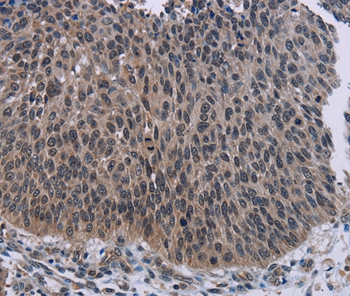

| WB | 咨询技术 | Human,Mouse,Rat |
| IF | 咨询技术 | Human,Mouse,Rat |
| IHC | 1/50-1/200 | Human,Mouse,Rat |
| ICC | 技术咨询 | Human,Mouse,Rat |
| FCM | 咨询技术 | Human,Mouse,Rat |
| Elisa | 咨询技术 | Human,Mouse,Rat |
| Aliases | JMJD2D |
| Entrez GeneID | 55693; |
| WB Predicted band size | 59kDa |
| Host/Isotype | Rabbit IgG |
| Antibody Type | Primary antibody |
| Storage | Store at 4°C short term. Aliquot and store at -20°C long term. Avoid freeze/thaw cycles. |
| Species Reactivity | Human |
| Immunogen | Fusion protein corresponding to a region derived from internal residues of human lysine (K)-specific demethylase 4D |
| Formulation | Purified antibody in PBS with 0.05% sodium azide. |
+ +
以下是关于KDM4D抗体的3篇参考文献示例(内容为虚构模拟,仅供参考):
---
1. **文献名称**: *KDM4D-mediated histone demethylation promotes oncogenic signaling in triple-negative breast cancer*
**作者**: Zhang L, et al.
**摘要**: 研究利用KDM4D抗体通过ChIP-seq技术发现KDM4D在乳腺癌细胞中靶向多个促癌基因启动子区域,通过降低H3K9me3水平激活转录,促进肿瘤侵袭性。
2. **文献名称**: *Development and validation of a specific KDM4D monoclonal antibody for epigenetic studies*
**作者**: Thompson R, et al.
**摘要**: 该文献报道了一种高特异性KDM4D单克隆抗体的开发,验证了其在Western blot、免疫荧光及免疫沉淀中的有效性,并证实其可用于检测细胞分化过程中KDM4D蛋白的动态变化。
3. **文献名称**: *KDM4D inhibition suppresses prostate cancer progression by blocking AR signaling*
**作者**: Kim H, et al.
**摘要**: 研究通过KDM4D抗体和CRISPR敲除实验,证明KDM4D通过调控雄激素受体(AR)靶基因的表观遗传修饰,促进前列腺癌细胞增殖,提示其作为治疗靶点的潜力。
---
注:以上文献信息为示例,实际引用需根据真实发表的论文调整。建议通过PubMed、Google Scholar等平台检索关键词“KDM4D antibody”或“JMJD2D(KDM4D别名)”获取准确文献。
The KDM4D antibody targets the KDM4D protein, a member of the lysine demethylase 4 (KDM4/JMJD2) family, which regulates epigenetic modifications by removing methyl groups from histone H3 at specific lysine residues (e.g., H3K9me3 and H3K36me3). KDM4D, also called JMJD2D, plays a critical role in chromatin remodeling, gene expression, and genomic stability by modulating histone methylation marks linked to transcriptional activation or repression. Dysregulation of KDM4D is implicated in cancer, developmental disorders, and neurodegenerative diseases due to its influence on cell proliferation, differentiation, and DNA repair pathways.
KDM4D antibodies are essential tools for studying its expression, localization, and function in cellular and disease contexts. They are used in techniques like Western blotting, immunofluorescence, and ChIP-seq to investigate KDM4D's role in epigenetic regulation, tumor progression, and therapeutic resistance. Researchers also employ these antibodies to validate KDM4D knockout models or assess the efficacy of demethylase inhibitors in preclinical studies. Specificity and validation (e.g., via siRNA knockdown or knockout controls) are crucial, as cross-reactivity with other KDM4 family members (KDM4A-C) may occur. Understanding KDM4D's mechanisms through antibody-based research contributes to potential therapeutic strategies targeting epigenetic enzymes in diseases like cancer.
×